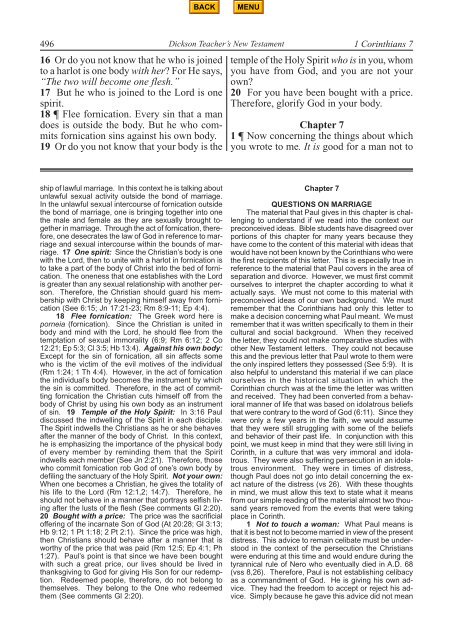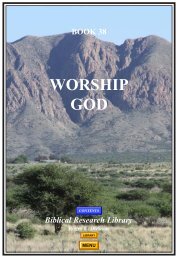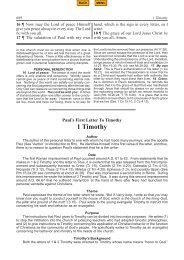1 Corinthians
1 Corinthians
1 Corinthians
Create successful ePaper yourself
Turn your PDF publications into a flip-book with our unique Google optimized e-Paper software.
496 Dickson Teacher’s New Testament<br />
16 Or do you not know that he who is joined<br />
to a harlot is one body with her For He says,<br />
“The two will become one flesh.”<br />
17 But he who is joined to the Lord is one<br />
spirit.<br />
18 Flee fornication. Every sin that a man<br />
does is outside the body. But he who commits<br />
fornication sins against his own body.<br />
19 Or do you not know that your body is the<br />
1 <strong>Corinthians</strong> 7<br />
temple of the Holy Spirit who is in you, whom<br />
you have from God, and you are not your<br />
own<br />
20 For you have been bought with a price.<br />
Therefore, glorify God in your body.<br />
Chapter 7<br />
1 Now concerning the things about which<br />
you wrote to me. It is good for a man not to<br />
ship of lawful marriage. In this context he is talking about<br />
unlawful sexual activity outside the bond of marriage.<br />
In the unlawful sexual intercourse of fornication outside<br />
the bond of marriage, one is bringing together into one<br />
the male and female as they are sexually brought together<br />
in marriage. Through the act of fornication, therefore,<br />
one desecrates the law of God in reference to marriage<br />
and sexual intercourse within the bounds of marriage.<br />
17 One spirit: Since the Christian’s body is one<br />
with the Lord, then to unite with a harlot in fornication is<br />
to take a part of the body of Christ into the bed of fornication.<br />
The oneness that one establishes with the Lord<br />
is greater than any sexual relationship with another person.<br />
Therefore, the Christian should guard his membership<br />
with Christ by keeping himself away from fornication<br />
(See 6:15; Jn 17:21-23; Rm 8:9-11; Ep 4:4).<br />
18 Flee fornication: The Greek word here is<br />
porneia (fornication). Since the Christian is united in<br />
body and mind with the Lord, he should flee from the<br />
temptation of sexual immorality (6:9; Rm 6:12; 2 Co<br />
12:21; Ep 5:3; Cl 3:5; Hb 13:4). Against his own body:<br />
Except for the sin of fornication, all sin affects some<br />
who is the victim of the evil motives of the individual<br />
(Rm 1:24; 1 Th 4:4). However, in the act of fornication<br />
the individual’s body becomes the instrument by which<br />
the sin is committed. Therefore, in the act of committing<br />
fornication the Christian cuts himself off from the<br />
body of Christ by using his own body as an instrument<br />
of sin. 19 Temple of the Holy Spirit: In 3:16 Paul<br />
discussed the indwelling of the Spirit in each disciple.<br />
The Spirit indwells the Christians as he or she behaves<br />
after the manner of the body of Christ. In this context,<br />
he is emphasizing the importance of the physical body<br />
of every member by reminding them that the Spirit<br />
indwells each member (See Jn 2:21). Therefore, those<br />
who commit fornication rob God of one’s own body by<br />
defiling the sanctuary of the Holy Spirit. Not your own:<br />
When one becomes a Christian, he gives the totality of<br />
his life to the Lord (Rm 12:1,2; 14:7). Therefore, he<br />
should not behave in a manner that portrays selfish living<br />
after the lusts of the flesh (See comments Gl 2:20).<br />
20 Bought with a price: The price was the sacrificial<br />
offering of the incarnate Son of God (At 20:28; Gl 3:13;<br />
Hb 9:12; 1 Pt 1:18; 2 Pt 2:1). Since the price was high,<br />
then Christians should behave after a manner that is<br />
worthy of the price that was paid (Rm 12:5; Ep 4:1; Ph<br />
1:27). Paul’s point is that since we have been bought<br />
with such a great price, our lives should be lived in<br />
thanksgiving to God for giving His Son for our redemption.<br />
Redeemed people, therefore, do not belong to<br />
themselves. They belong to the One who redeemed<br />
them (See comments Gl 2:20).<br />
Chapter 7<br />
QUESTIONS ON MARRIAGE<br />
The material that Paul gives in this chapter is challenging<br />
to understand if we read into the context our<br />
preconceived ideas. Bible students have disagreed over<br />
portions of this chapter for many years because they<br />
have come to the content of this material with ideas that<br />
would have not been known by the <strong>Corinthians</strong> who were<br />
the first recipients of this letter. This is especially true in<br />
reference to the material that Paul covers in the area of<br />
separation and divorce. However, we must first commit<br />
ourselves to interpret the chapter according to what it<br />
actually says. We must not come to this material with<br />
preconceived ideas of our own background. We must<br />
remember that the <strong>Corinthians</strong> had only this letter to<br />
make a decision concerning what Paul meant. We must<br />
remember that it was written specifically to them in their<br />
cultural and social background. When they received<br />
the letter, they could not make comparative studies with<br />
other New Testament letters. They could not because<br />
this and the previous letter that Paul wrote to them were<br />
the only inspired letters they possessed (See 5:9). It is<br />
also helpful to understand this material if we can place<br />
ourselves in the historical situation in which the<br />
Corinthian church was at the time the letter was written<br />
and received. They had been converted from a behavioral<br />
manner of life that was based on idolatrous beliefs<br />
that were contrary to the word of God (6:11). Since they<br />
were only a few years in the faith, we would assume<br />
that they were still struggling with some of the beliefs<br />
and behavior of their past life. In conjunction with this<br />
point, we must keep in mind that they were still living in<br />
Corinth, in a culture that was very immoral and idolatrous.<br />
They were also suffering persecution in an idolatrous<br />
environment. They were in times of distress,<br />
though Paul does not go into detail concerning the exact<br />
nature of the distress (vs 26). With these thoughts<br />
in mind, we must allow this text to state what it means<br />
from our simple reading of the material almost two thousand<br />
years removed from the events that were taking<br />
place in Corinth.<br />
1 Not to touch a woman: What Paul means is<br />
that it is best not to become married in view of the present<br />
distress. This advice to remain celibate must be understood<br />
in the context of the persecution the Christians<br />
were enduring at this time and would endure during the<br />
tyrannical rule of Nero who eventually died in A.D. 68<br />
(vss 8,26). Therefore, Paul is not establishing celibacy<br />
as a commandment of God. He is giving his own advice.<br />
They had the freedom to accept or reject his advice.<br />
Simply because he gave this advice did not mean









